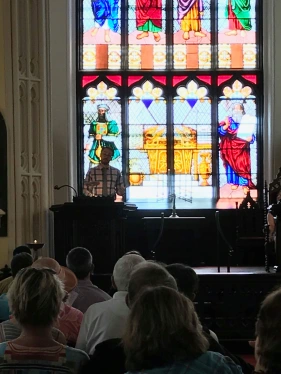 I preached this past Sunday at the Unitarian Church in Charleston, a community I am proud to call one of my spiritual homes. Here it is, linked. But given revelations regarding the sins and crimes of the Catholic Church this week, I feel I need to say a few more words as well.
I preached this past Sunday at the Unitarian Church in Charleston, a community I am proud to call one of my spiritual homes. Here it is, linked. But given revelations regarding the sins and crimes of the Catholic Church this week, I feel I need to say a few more words as well.
I am a bit of an oddball in this community. I am not an “ex-” or “lapsed” or “I-was-raised Catholic” Catholic, but a bona fide Catholic member of this UU congregation. (Trust me, it’s complicated.) I preached on what I called the Catholic humanist tradition, on why I am committed to the dignity of and justice for all human beings not in spite of my Catholicism but because of it. I stood before the congregation and shared some of the gifts I’ve been given from this Catholic humanist tradition – the tradition of saints Francis and Clare, of Dorothy Day and Thomas Merton, of Cesar Chavez and Oscar Romero, of Sr. Thea Bowman and Fr. George Clements – in the hopes of offering some lessons from one humanist tradition to another. But I knew that, for good reason, UU churches serve as spiritual safe havens for all sorts of people, including many “recovering Catholics.” And so, before I invited the congregation to see Catholicism anew, I confessed that, even as a self-identified “practicing” Catholic, I consider myself in good company with those who have been hurt, marginalized, oppressed, and enraged by Catholics and the Catholic Church. Two days later, the Pennsylvania grand jury released their report on a generation of abuse and violence perpetrated by priests and enabled by the institutional apparatus of the Church itself, a report that (once again) revealed the moral bankruptcy of an institution more invested in protecting its own power than in safeguarding the lives of its parishioners. If you read my sermon, you will note that my sense of what it means to be Catholic, what it means for me to claim a “Catholic humanism,” stands apart from that institutional apparatus. It has roots in it without a doubt, but also remains both deeply skeptical and robustly critical of it. Needless to say, I could not have written this particular sermon if I had been preaching this Sunday instead of last. So, as I share the text of my sermon, I want to say that today (as I do every day), I write as one of those hurt and enraged by Catholics and the Catholic Church. And when friends ask me how I can remain Catholic in the face of such moral monsters, I can tell them about my own sense of the tradition and what keeps me calling myself Catholic. But I can also say, truthfully, that there are more than enough reasons why someone would decide that they cannot and will not make that distinction. And I, for one, will not work to convince them otherwise.
